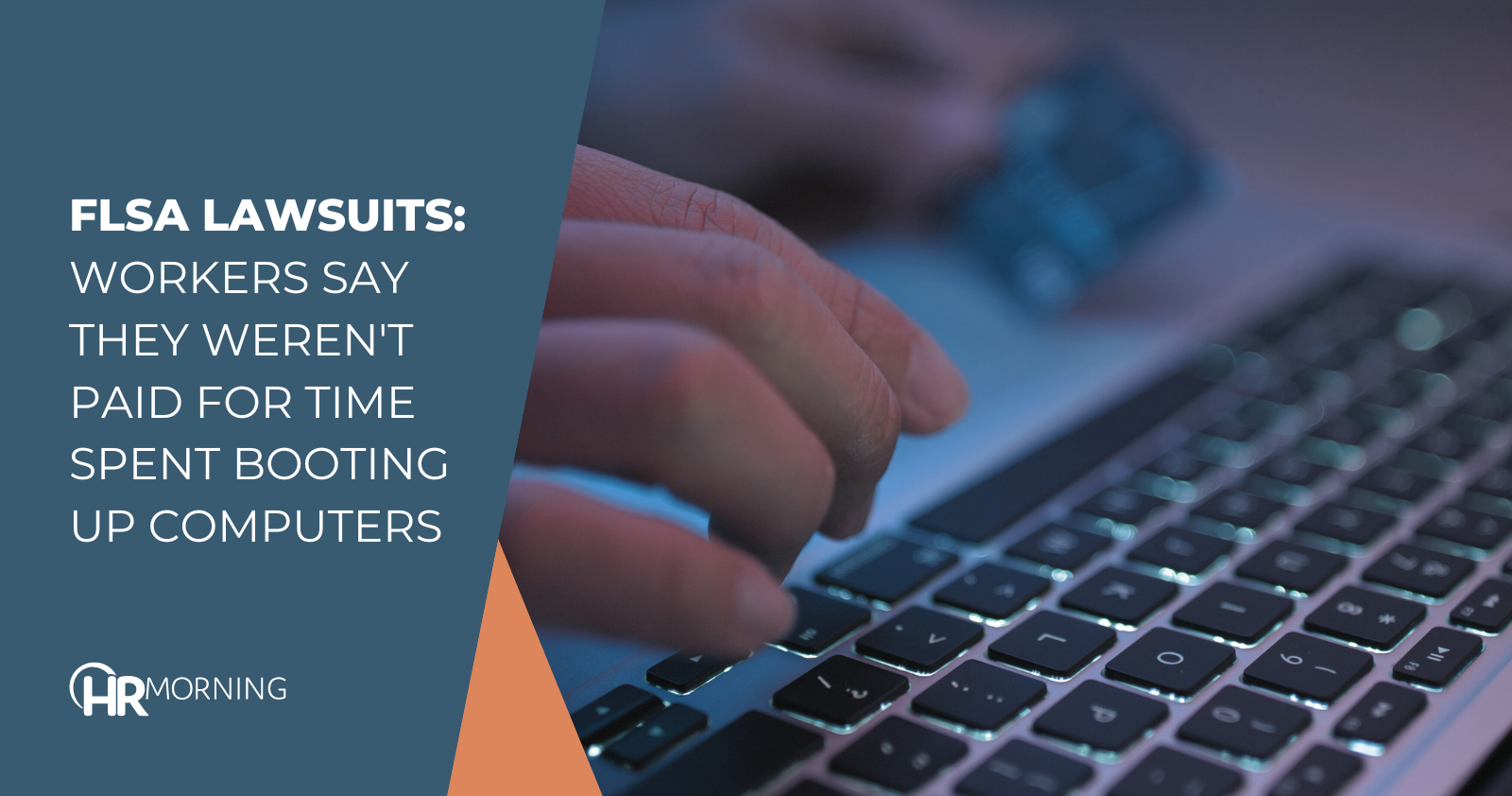New wave of FLSA lawsuits gain steam: 3 cases to watch

When you hear “FLSA lawsuits,” you probably think about wage-and-hour disputes and overtime violations. But we’ve spotted an interesting trend in FLSA lawsuits filed this summer. Here’s what HR needs to know:
Customer service reps at three big-name companies have filed class-action lawsuits, asserting they are not being paid for all time worked in violation of the Fair Labor Standards Act (FLSA). Specifically, they allege their employers do not pay them for the time spent logging in to computer programs that are necessary to do their jobs.
Today, the complaints appear to be limited to call centers. But it’s not a stretch to predict that employees in other computer-dependent jobs might file similar claims, especially if these early suits are successful.
3 FLSA lawsuits — virtually identical claims
1. Wayfair
Three customer service representatives filed a class-action lawsuit against Wayfair, alleging the company failed to pay them for time spent logging in to computer programs that were necessary for them to do their jobs. The suit alleges the company violated the FLSA and several state laws.
The three named plaintiffs are nonexempt, remote employees who work in their home states of Maine, Oregon and South Carolina.
They assert that company policy required them to have their computers connected to the network, with software programs opened and ready to work at the start of their shifts. As a result, they say they were not paid for time spent on preliminary tasks that were essential to their work. Further, they say they typically spend 10 to 15 minutes on these tasks. Moreover, on occasions where they ran into technical difficulties, they spent up to 30 minutes on these tasks.
Counts, et al. v. Wayfair LLC, No. 1:23-cv-11706 (D. Mass. filed 7/28/23).
2. Chewy
A customer service representative filed a class-action lawsuit against Chewy, alleging the company doesn’t pay nonexempt call reps for all time worked. Specifically, the suit claims Chewy requires the reps to take calls and answer questions the moment their shift begins, but it does not permit them to clock in until the exact start of their shift.
According to the suit, this means the reps have to arrive before the start of their shift to turn on their computers and open software programs – before clocking in – so they are ready to take customer calls. The suit claims the policy requires reps to work an average of seven minutes per shift without pay. Moreover, the suit claims that reps at three call centers – one in Florida and two in Texas – risk disciplinary action if they clock in early or are not available at the beginning of each shift.
Millican v. Chewy Inc., No. 1:23-cv-11587-DJC (D. Mass. filed 7/14/23).
3. SiriusXM
A customer service representative filed a class-action lawsuit against SiriusXM, alleging the company violates wage-and-hour laws by not paying nonexempt employees for all hours worked.
According to the complaint, the company required reps to be “call ready” at the start of each shift but did not allow them to clock in early to boot up their computers and open necessary software programs. The suit claims the reps often faced tech issues delaying their ability to log in, which meant they ended up working about 25 minutes each day without pay. Moreover, reps were allegedly disciplined if they were not “call ready” at the start of shifts.
Mitchell v. Sirius XM Radio Inc., No. 1:23-cv-06092 (S.D.N.Y. filed 7/14/23).
Mixed rulings in similar case
These three lawsuits pose an interesting question: Do nonexempt employees have to be paid for the time spent booting up and shutting down computers?
Though the question sounds simple, it’s at the center of a long-running legal dispute with similar facts to the complaints above. We covered the full case here, but here’s a quick recap:
In Cadena v. Customer Connexx, LLC, nonexempt call service reps in Nevada sued under the FLSA, alleging they were not paid for time spent booting up and shutting down computers. They claimed the unpaid hours also resulted in overtime violations. The long legal battle sent the case to the Ninth Circuit, which issued a partial ruling for the employees and remanded the case.
On remand, the district court granted the company’s motion for summary judgment, finding the employees failed to show the time was more than de minimis. Significantly, most employees testified that “it took mere seconds or a couple of minutes to turn the computer on and off.”
The court said this testimony was “consistent with common sense that pushing or clicking a button or opening a computer program typically takes little time,” and recording such small fragments of time for payroll purposes could present logistical problems. In addition, the irregularity of alleged unpaid work also favored a finding for the company. Employees had to turn on and boot up computers every day. But “the occasions when the logins or logouts took longer were irregular in both frequency and duration,” the court determined. The court granted the company’s motion for judgment.
The employees filed an appeal, sending the case to the Ninth Circuit for a second time. We’ll keep you posted.

